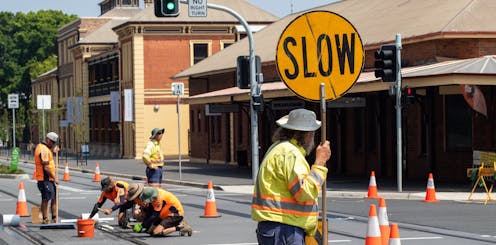Inflation still the 'defining challenge' as Australia's economic activity slows
- Written by John Hawkins, Senior Lecturer, Canberra School of Politics, Economics and Society, University of Canberra

Australia has recovered better than most from the COVID pandemic. As measured by gross domestic product (GDP), the economy is now 7% larger than it was before the pandemic.
Over 2022, the economy expanded by 2.7% – more than any of the seven largest advanced economies, and more than twice the average growth rate in the OECD[1].
That’s the good news from the latest national accounts[2] data from the Australian Bureau of Statistics, covering the last quarter of 2022. Federal Treasurer Jim Chalmers dutifully noted these things in his press conference following the release of the accounts. But he was far from exuberant.
The economic story of 2022 was complete, he said, but the unfolding story of 2023 was unpredictable.
He was “cautiously optimistic[3]” inflation had peaked. But he warned that rising prices remained “the defining challenge” amid a global economic slowdown and geopolitical uncertainty. In particular, he noted concerns about rising interest rates and wages not keeping pace with increases in the cost of living.
Growth is slowing
The December quarter accounts provided the the first set of annual accounts since 2019 unaffected by COVID-related measures such as lockdowns and border closures.
GDP growth was 0.6% in the first quarter of 2022, 0.9% in the second, and 0.7% in the third. The 0.5% growth in the December quarter therefore indicates economic activity is slowing (or “moderating”, as Chalmers put it).
In the December quarter, exports rose by 1.1% as the tourism and the international education markets rebounded. Imports fell by 4.3%, implying some spending on foreign goods and services was replaced by domestic goods and services.
Partly offsetting this was that companies invested less – an indication of lower confidence about the future. Dwelling investment also declined. The Australian Bureau of Statistics attributed this to the completion of renovations that had been subsidised by the Morrison Government’s HomeBuilder scheme.
Read more: Scott Morrison’s HomeBuilder scheme is classic retail politics but lousy economics[4]
Per capita performance
So what does this mean for the average person?
The best indicator of this in the national accounts is real net national disposable income per capita[5]. This removes the effects of population growth and inflation.
Some of the recent increase, however, is attributable to higher commodity prices benefiting our miners and farmers, which may not be flowing through to the “average” Australian.
(There are also other aspects of wellbeing[6] not captured by this measure. It still provides a useful proxy for the standard of living.)
Wages aren’t growing much
What’s clear is that inflation is not being driven by wage increases. The share of national income going to labour (workers) remains near a 60-year low[7]. Conversely, the share going to capital (as profits to owners and investors) is near a 60-year high.
Household saving falling
Household savings surged during COVID, as opportunities to spend on entertainment, leisure and travel were curtailed. The household saving ratio has now returned to its pre-COVID level.
This is partly due to higher spending on things like dining out, but it also reflects tightening budgets as cost-of-living pressure and interest rate increases weigh on family budgets. Overall, consumer spending in the December quarter rose just 0.3%, the weakest quarterly rise since the September 2021 quarter, which was affected by lockdowns in Melbourne and Sydney.
There is more pain to come. Despite Chalmers’ cautious optimism that inflation has peaked, the Reserve Bank of Australia is still likely to increase interest rates further, in its mission to return inflation to its 2-3% target range while not dampening economic activity so much that a recession ensues.
Read more: The Lowe road – the RBA is treading a 'narrow path' between inflation and recession[8]
RBA governor Philip Lowe has described it as a “narrow path”. He’s right.
References
- ^ OECD (www.oecd.org)
- ^ national accounts (www.abs.gov.au)
- ^ cautiously optimistic (ministers.treasury.gov.au)
- ^ Scott Morrison’s HomeBuilder scheme is classic retail politics but lousy economics (theconversation.com)
- ^ real net national disposable income per capita (www.abs.gov.au)
- ^ wellbeing (press-files.anu.edu.au)
- ^ near a 60-year low (www.abc.net.au)
- ^ The Lowe road – the RBA is treading a 'narrow path' between inflation and recession (theconversation.com)
Authors: John Hawkins, Senior Lecturer, Canberra School of Politics, Economics and Society, University of Canberra










